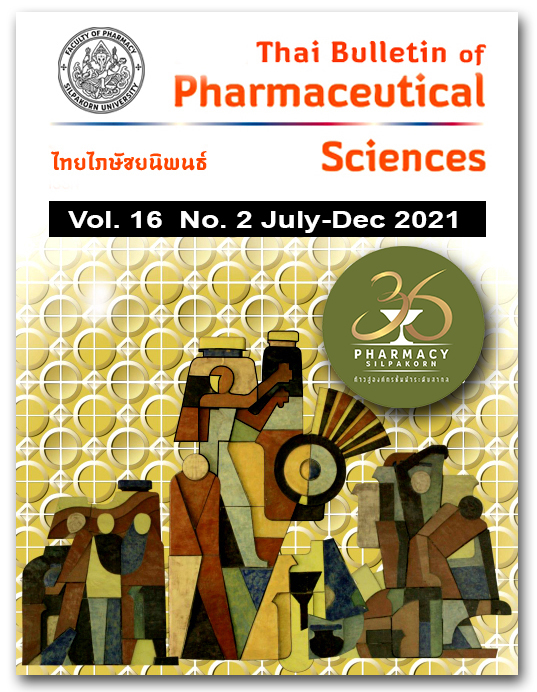WILL THE RATINGS AND REVIEWS OF ONLINE DIETARY SUPPLEMENT SCREEN FOR UNSAFE PRODUCTS IN THE E-MARKETPLACE
DOI:
https://doi.org/10.69598/tbps.16.2.111-118Keywords:
consumer opinion, dietary supplement, e-marketplaceAbstract
The dietary supplement market has been growing rapidly, resulting in an increased risk of consuming unsafe products. Therefore, it is important to separate unsafe products from available products. The objective of this cross-sectional study was to determine the relationship of consumer opinions towards unsafe online dietary supplement, which was shown as product ratings and product reviews. The lists of products from the health product contamination examination reports from 2016 to 2018 were applied as reference products. The available products in the e-marketplaces (LAZADA and Shopee) and their ratings and reviews between October to December 2019 have been collected and divided into 2 groups: safe and unsafe products according to reference products. Product rating was analysed by t-test whereas, product reviews were analyzed by sentiment analysis and principal component analysis (PCA). Consequently, 46 products with 288 ratings and 496 reviews were analysed. The results showed that there was no statistically significant difference in product rating between safe and unsafe products (p-value = 0.471). The reviews were classified based on marketing mix (product, price, place, and promotion) and polarity (positive, neutral, and negative). The reviews related to product and price aspects in the unsafe product group were higher than the other group. The proportion of negative reviews in the unsafe product group was higher than the other group. The result was found that product reviews of safe and unsafe product groups cannot be separated. In conclusion, There was no relationship between consumer opinions and unsafe online dietary supplements. Therefore, the consideration of product ratings and product reviews cannot be used to screen unsafe products from any available products.
References
Norzieiriani A, Azizah O, Ramayah T. Consumer lifestyles and online shopping continuance intention. Bus Strateg Ser. 2010;11(4):227–43.
2020 Thailand Internet user behavior report [Internet]. Bangkok: Electronic Transactions Development Agency; 2020 [cited 2021 Jan 15]. Available from: https://www.etda.or.th/th/Useful-Resource/publications/ Thailand-Internet-User-Behavior-2020.aspx.
Market share of dietary supplements in Thailand [Internet]. Bangkok: Food Industry Intelligence Center of Thailand; 2016 [cited 2020 Dec 25]. Available from: http://fic.nfi.or.th/ FoodMarketShareInThailandDetail.php?id=248
Report of the complaint management regarding health products 2018 [Internet]. Nonthaburi: Ministry of Public Health; 2018 [cited 2020 Dec 20]. Available from: https://syr.us/beW
Report of the complaint management regarding health products 2019 [Internet]. Nonthaburi: Ministry of Public Health; 2019 [cited 2020 Dec 20]. Available from: https://syr.us/2rx
Report of the complaint management regarding health products 2020 [Internet]. Nonthaburi: Ministry of Public Health; 2020 [cited 2020 Dec 20]. Available from: https://syr.us/nw8
Food and drug administration news [Internet]. Nonthaburi: Food and Drug Administration; 2020 [cited 2021 Mar 12]. Available from: https://www.fda.moph.go.th/SitePages/ AllNews.aspx
Department of Medical Sciences. Annual report 2020 by the Bureau of Quality and Safety of Food, Department of Medical Sciences. 1st ed. Nonthaburi: 2020.
Songsin S. The prevalence of food products that illegally claim their properties on the label in Loei Province flea markets. Thai J Pharm Pract. 2019;11(1):151–9.
Syakira NA, Kamarulzaman NH. Factors influencing consumers’ behaviour towards fraudulent dietary supplements. Malaysian J Agric Econ. 2020;29(1):1-21.
Liu Y, Bi JW, Fan ZP. Ranking products through online reviews: A method based on sentiment analysis technique and intuitionistic fuzzy set theory. Inf Fusion. 2017;36:149–61.
The health product contamination examination report 2016. Nonthaburi: Department of Medical Sciences; 2016.
The health product contamination examination report 2017. Nonthaburi: Department of Medical Sciences; 2017.
The health product contamination examination report 2018. Nonthaburi: Department of Medical Sciences; 2018.
Waterschoot W, Bulte C. The 4P classification of the marketing mix revisited. J Mark. 1992;56(4):83–93.
Kausar S, Huahu X, Ahmad W, Shabir MY. A sentiment polarity categorization technique for online product reviews. IEEE Access. 2019;8:3594–605.
Horel JD. Complex principal component analysis: theory and examples. J Clim Appl Meteorol. 1984;23(12):1660–73.
Jolliffe IT, Cadima J. Principal component analysis: a review and recent developments. Philos Trans R Soc A Math Phys Eng Sci. 2016;374(2065):20150202.
Chotthitaporn N, Klaewkla J, Sompopcharoen M. Factors affecting to purchasing decision on dietary supplement products for beauty through Internet among professional nurses. Thai Red Cross Nurs J. 2019;12(2):151–64.
Pannasewi S. Korean popular culture and decision-making for food supplements and beauty products among female consumers in Bangkok. Suthiparithat J. 2016;30(96):146–57.
Thongpun W. Satisfaction and behaviour toward beauty aids dietary supplement products consumption of consumers in Bangkok metropolitan area [Dissertation]. Bangkok: Srinakharinwirot Universisty; 2003. (in Thai)
Konkra A. Marketing mix affecting product selection dietary supplements of consumers in Phayao municipality. J Pacific Inst Manag Sci. 2016;2(1):35–44.
Benjawan S. The perspective of stakeholders towards the problems and solutions of health products available through social commerce in Thailand. Int J Manag Appl Sci. 2019;5(8):88–92.
Wu Y, Ngai EWT, Wu P, Wu C. Fake online reviews: Literature review, synthesis, and directions for future research. Decis Support Syst. 2020;132:113280.
Chiba T, Sato Y, Kobayashi E, Ide K, Yamada H, Umegaki K. Behaviors of consumers, physicians and pharmacists in response to adverse events associated with dietary supplement use. Nutr J. 2017;16(1):18.
Ng JY, Zhang CJ, Ahmed S. Dietary and herbal supplements for fatigue: A quality assessment of online consumer health information. Integr Med Res. 2021;10(4):100749.
Vinijchaiyanun C, Vichitthamaros P. Factors affecting weight control dietary supplements consumption of people in Bangkok. WMS J Manag. 2017;6(1):84–90.
Praphasai P. Perceived risk and perceived product value affecting the purchase decision dietary supplements of consumer in Bangkok [Dissertation]. Bangkok: Bangkok University; 2016. (in Thai)
Downloads
Published
How to Cite
Issue
Section
License
All articles published and information contained in this journal such as text, graphics, logos and images is copyrighted by and proprietary to the Thai Bulletin of Pharmaceutical Sciences, and may not be reproduced in whole or in part by persons, organizations, or corporations other than the Thai Bulletin of Pharmaceutical Sciences and the authors without prior written permission.



